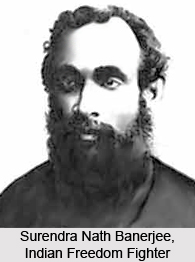 Surendra Nath Banerjee was also known by the name Rashtaguru. He later on became a senior leader of the Indian National Congress. Surendra Nath Banerjee was born in Calcutta to a Bengali Brahmin family. He received his education from the Parental Academic Institution and the Hindu College. He was influenced by his father Durga Charan Banerjee who was a doctor. After his graduation he travelled to England in 1868, along with Romesh Chunder Dutt and Behari Lal Gupta to compete in ICS examinations.
Surendra Nath Banerjee was also known by the name Rashtaguru. He later on became a senior leader of the Indian National Congress. Surendra Nath Banerjee was born in Calcutta to a Bengali Brahmin family. He received his education from the Parental Academic Institution and the Hindu College. He was influenced by his father Durga Charan Banerjee who was a doctor. After his graduation he travelled to England in 1868, along with Romesh Chunder Dutt and Behari Lal Gupta to compete in ICS examinations.
After returning to India in 1875, Banerjee became an English professor at the Metropolitan Institution, the Free Church Institution and at the Ripon College. He along with Anandamohan Bose founded the Indian National Association. It was the first Indian political organization of its kind. Through this organization he tackled the issue of age-limit for Indian students appearing for ICS examinations.
The newspaper `The Bengalee` was founded by him in 1879. Banerjee had merged his organization with Indian National Congress owing to their common objectives and memberships. In 1895 in Pune he was elected the Congress President and in 1902 at Ahmedabad.
Surendra Nath was one of the important public leaders who protested the partition of Bengal. He became the supporter of upcoming Indian leaders like Gopal Krishna Gokhale. He was also one of the senior-most leaders of the "moderate" Congress. His role was instrumental in the Swadeshi movement.
He supported the Morley-Minto Reforms Act (1909) - which was ridiculed by the vast majority of the Indian public and nationalist politicians. He was a critic of the civil disobedience advocated by Mahatma Gandhi. When he accepted the portfolio of minister in the Bengal government he earned lot of criticism. He however made the Calcutta Municipal Corporation a democratic body.
He is remembered as a pioneer leader of Indian politics. His composition `A nation in Making` was published that was highly acclaimed. The British referred to him during his later years as "Surrender Not" Banerjee. He was elected to the reformed Legislative Council of Bengal in the year 1921. He held office as minister for local self-government from 1921 to 1924. He died at Barrackpore on August 6, 1925.




















